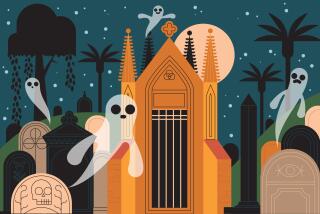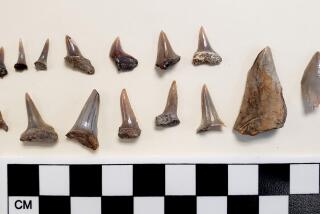Natural Resources
- Share via
Going once, going twice, and the prehistoric mosasaur goes to . . .
Riding the recent wave of Hollywood fascination with gigantic lizards and celestial threats, a Los Angeles auction house Sunday switched from its usual fine arts to the stuff of natural history museums.
“Meteorites Headed for California!” Butterfield & Butterfield, the auction house, announced in a statement heralding Sunday’s sale. “Extraordinary specimen which crashed into Earth to be sold to the highest bidder.”
The hyperbole apparently paid off. The company grossed $1.2 million in its first auction of natural history items.
Two of the more than 30 rocks on the block drew the highest bids. A 996-pound meteorite sold for $101,500, and shared top price with a Frisbee-size iron meteorite that looks like a giant corn flake.
Along with the meteorites and the fossil mosasaur--an aquatic lizard that lived eons ago--the company also put up for bid a 12,500-year-old skeleton of a woolly mammoth, as well as dinosaur eggs, shark teeth and an assortment of gems. In all, 362 items were offered.
“I am sorry to say the woolly mammoth did not find a new home,” Levi Morgan, a spokesman for Butterfield & Butterfield, said after the auction. However, the mosasaur, 20 1/2 feet long, sold for $40,250.
“I was surprised to learn that people would bid on this stuff,” said Glenn White, a Los Angeles lawyer and a collector of fossils.
White said he has been collecting fossils since he was 8, buying them at shows or specialized stores, but this was the first auction he had attended. He said he came to bid on some small items and research the value of his own collection, which consists of about 1,000 pieces.
Morgan said auctions of natural history items were once rare. But no more.
Morgan said the idea of brokering natural history items originated a few years ago, and the recent slew of movies about dinosaurs and Earth-bound meteors has it easier to convince sellers that there would be public interest in such merchandise.
“We got a little help from Hollywood,” Morgan said.
In recent years, a few auctioneers have hawked fossils and other items at sales in New York. The sale Sunday, according to officials of the auction house and others in Los Angeles for the event, is believed to have been the first of its kind in California.
“We had phone bidding from Germany and England and some 20 states,” Morgan said. “The market is worldwide and we are happy to find out that it does not mind spending dollars in California instead of New York.”
The auction was conducted simultaneously in Los Angeles and San Francisco using television monitors to showcase the items. About 50 prospective buyers attended in the company’s Los Angeles office.
Most of the items for sale Sunday came from traders and private collectors who acquired them from other traders, museums and “commercial paleontologists,” said David Herskowitz, director of the auction house’s new natural history department.
Herskowitz and Morgan conceded that the practice is not without controversy. Some in the scientific community oppose the selling and trading of these objects to the highest bidder.
“They may feel priced out,” Morgan said.
Still, Morgan and Herskowitz defended the auction as a good way of generating revenue--which, in turn, funds other private projects in the search for new archeological and geological finds.
“We wouldn’t sell anything that would otherwise not be available to museums,” said Herskowitz, dismissing concerns that a significant and unique scientific find might languish on someone’s mantel.
Darryl Pitt, a curator for the New York-based MacovichCollection, a private brokerage that provided most of the meteorites on the block Sunday, said he understands the reservations.
“Some would say that there should be no private ownership of these items, but if the public sector does not have the wherewithal to recover them, then a private market may be a good thing,” Pitt said.
Sounding a bit like a salesman and a lot like a rock junkie, Pitt explained at length the scientific significance of meteorites.
“If each planet is a cookie, then meteorites are the cookie dough,” he said, holding an iridescent slab. “They help us understand how the solar system was formed.”
Still, he said, there is little danger that science will miss out on a discovery because his company is trading space rocks.
If an especially rare specimen is found, he said, “it is incumbent on those of us who are sensitive to make certain that exotic materials are available first to institutions. Otherwise, I would be a pariah.”
But White, the Los Angeles collector, put it more bluntly. “I am an avid believer in the free-market system,” he said. “If museums want these pieces let them buy them in the market like the rest of us.”


